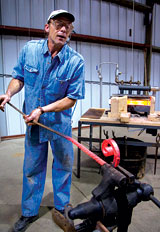The greening of striking red-hot iron

photo by Jonathan Welch
|
Ever heard the phrase “too many irons in the fire”? William Rogers, who has been a metal smith for 30 years, says it’s derived from the craft of blacksmithing: Stacking too many iron rods in the forge at one time could cause a smith to ruin one of them. Blacksmithing, according to Rogers, is all about timing. The metal has to be cycled through the forge at just the right pace so that it can be shaped and bent without resistance. The origin of the old saying, “strike while the iron is hot”? You guessed it.
While blacksmithing is usually considered an art form linked to traditions of the past, the shop Rogers is currently occupied with might well be a project that sets a precedent for the future. That’s because the forge in the workspace he’s developing is powered by recovered methane gas piped straight from a former landfill.
“This gas is a greenhouse gas that needs to be burned off anyway, so we’re solving two problems with one stroke,” Rogers says, perhaps without noticing that yet another allusion to his trade has made its way into words. The methane fuel is “a lot cleaner,” he adds, and much better for the blacksmiths’ health than smudgy coal, which is traditionally used to fire up forges and produces black smoke. “The real key to working in any environment like this is good ventilation,” he notes.
Rogers was hired as a consultant by the Jackson County Green Energy Park, situated on the site of a former landfill in Dillsboro, to oversee the blacksmithing studio. In operation since last October, the park uses tapped methane to power a number of projects, including Smoky Mountain Biofuels’ biodiesel-production facility and greenhouses; eventually, it will host more workspaces devoted to glassblowing, ceramics and welding. The landfill puts out 1.2 million British thermal units of heat per hour, supplying ample energy to keep the forge running eight hours a day at 1,900 degrees, the ideal temperature for blacksmithing.
“I’ve been in smithing for 30 years and heard of a lot of people using different tools — propane, coal and methane,” says Rogers. “But this is the first one that I know of that’s ever run off the landfill gases.”
The park recently received national recognition, claiming a Community Project of the Year award through the Environmental Protection Agency’s Landfill Methane Outreach Program. Director Timm Muth, who will travel to Baltimore next week to receive the award, says the EPA has cited no other methane-powered blacksmith forges running off landfill gas.
In the springtime, three aspiring smiths will be selected to utilize the methane-powered forges to develop their skills. To apply, contact Muth at 631-0271 or by e-mailing tmuth@jacksonnc.org.
What’s your AQ-IQ?
Last fall, Clean Air Community Trust’s Air Quality IQ contest challenged middle-school kids to think critically about air pollution and showcase their knowledge through multimedia projects.
This Saturday, CACT will hold its second annual Air Expo to honor the kids’ work in a “celebration of their creations,” says Margie Meares, who serves on the nonprofit’s board of trustees. Forty winners from middle schools all over Buncombe and Haywood Counties will be recognized.
One or more recipients of a $1,000 scholarship award will also be announced at the Air Expo. The prize will go to one or more winners of the “Air Pollution Solution,” a second CACT-sponsored contest that encouraged Buncombe high-school seniors to propose solutions to air-quality problems using multimedia displays.
The Air Expo will include lunch, a party and keynote addresses by Meares and Keith Bamberger of the N.C. Division of Air Quality. The event is free and open to the public. “It’s a great opportunity to meet the kids and their parents and to talk about these important issues,” says Meares.
The Air Expo will be held at the N.C. Arboretum on Sat., Jan. 27, from 1 to 4 p.m., with the awards ceremony at 2:15. RSVP at info@airtrust.org or by calling 258-1856.



Before you comment
The comments section is here to provide a platform for civil dialogue on the issues we face together as a local community. Xpress is committed to offering this platform for all voices, but when the tone of the discussion gets nasty or strays off topic, we believe many people choose not to participate. Xpress editors are determined to moderate comments to ensure a constructive interchange is maintained. All comments judged not to be in keeping with the spirit of civil discourse will be removed and repeat violators will be banned. See here for our terms of service. Thank you for being part of this effort to promote respectful discussion.